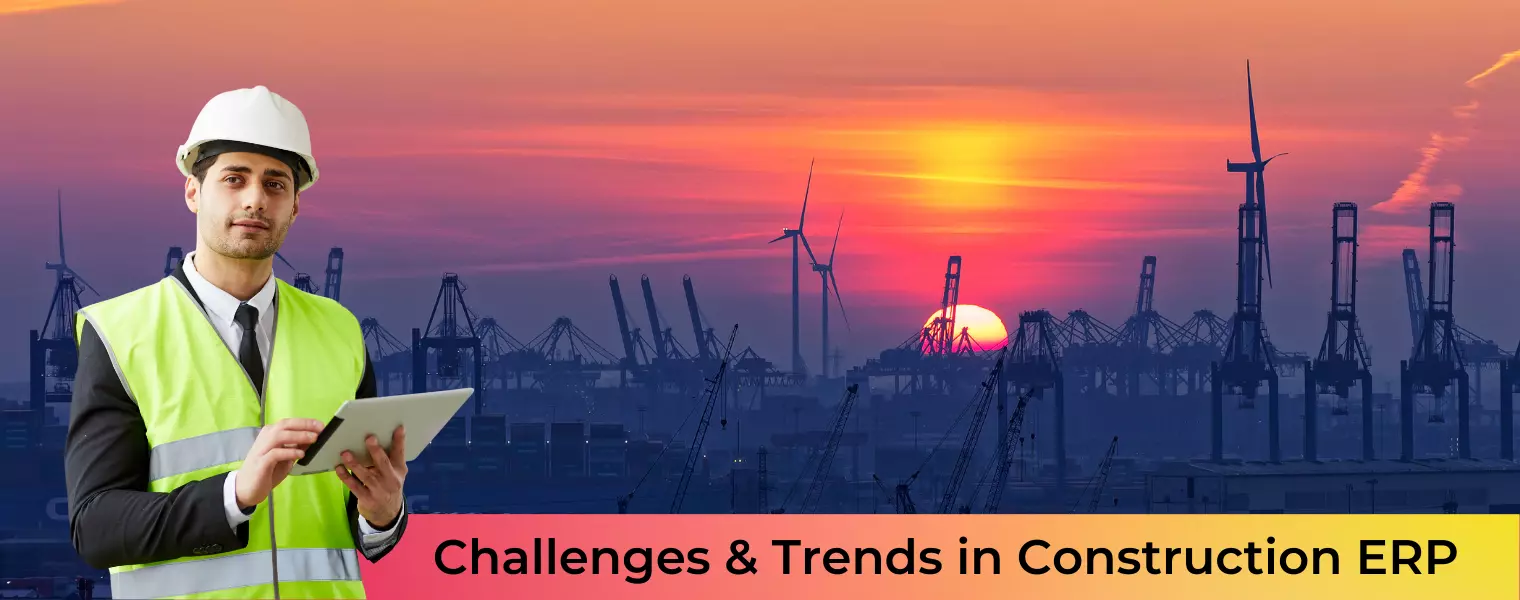
Construction ERP software is a specialized enterprise resource planning system designed specifically for the needs of construction firms. General contractor and subcontractor management, financial management, construction accounting, payroll, and service operations should all be integrated into a single database. A construction ERP system lays the groundwork for the digitization and integration of core business processes such as finance, project management, payroll, inventory management, and more. Artificial intelligence (AI) and Internet of Things (IoT) devices, which support increased productivity, also integrate seamlessly within ERP platforms.
Construction ERP is designed for construction companies of all sizes. Because ERP software is industry specific, construction industries require construction ERP software. Construction companies or industries that operate in multiple countries or states, in particular, require a centralized system to ensure that all information is stored and located centrally. This allows the company or industry to easily access the information, avoiding delays.
DoFort Construction ERP software or construction software in UAE, Solutions is a type of enterprise resource planning software. It is a unified, integrated solution that combines cutting-edge enterprise technologies with decades of construction industry experience. DoFort creates Construction Accounting and Service Management Software, as well as services, to assist commercial and industrial construction, engineering, and field service organizations in increasing productivity and overall performance.
Project management
Risk management
Financials
Human resources
Contractor and sub-contractor management
Document management
Inventory management
CAD interface
Service fleet asset management
Scheduling
Workflow processes
The challenges that a company faces will differ from one organization to the next, much like the benefits of ERP for construction firms. The construction industry is far too complex and diverse to identify a single issue that every company faces. Nonetheless, a construction ERP software system can assist in resolving common industry issues such as:
A construction ERP aids in the acceleration of project cycles in a variety of ways. An ERP, for example, can automate data-intensive tasks like RFI fulfillment, BIM processing, billing, and project management, reducing time spent on these processes while eliminating errors caused by manual data input.
Construction ERP systems significantly increase the amount and quality of data available for use. This enables businesses to perform analytics and forecasting more quickly and accurately. ERP analytics tools can also assist construction firms in producing more accurate estimates and quotes.
ERP systems can help construction companies eliminate blind spots, which occur when a company fails to collect, integrate, and analyze data from core operational processes. For example, project planning that is not integrated with financial data will result in a blind spot for a critical aspect of project management.
ERP software can incorporate new processes, apps, and data into the system, facilitating a business environment that strives for continuous improvement. Construction ERP can facilitate the deployment of innovation, the response to changing market conditions, and the response to industry developments such as shifting regulations.
When a construction company manually copies data from one system to another, redundant or duplicated data can occur. A construction software acts as a centralized database for all business data, reducing redundancy. Duplicate data increases storage costs and manual data errors, such as retrieving an old dataset by mistake. The presence of multiple copies of business data scattered across systems increases the number of targets that criminals can strike in order to obtain sensitive data or launch an attack.
The most important ERP trends are already influencing the construction industry. Companies will need to adapt to industry trends and innovations that improve the way ERP software supports core construction processes over the next decade.
AI and machine learning tools are inextricably linked to construction ERP software. ERP integrates data sources and processes, providing AI and machine learning tools with the raw data required to support the work of employees from various company departments. The use of AI and ML to improve business processes and data analysis is already making a difference in some industries, and it will continue to grow in the construction sector.
The shift to remote work was already underway before the pandemic accelerated it significantly. Some ERP and project management systems address this trend by providing a suite of remote work features and functions.
Remote work encompasses enterprise-wide processes, such as the ability to control machines and collect sensor data via a 5G network. Remote work capabilities, in some cases, allow employees to reduce their risk of injury when working on dangerous machinery or on job sites in high-risk environments. In other cases, remote work will allow businesses to reduce their office footprint while also allowing some employees to work from home.
AR devices can help construction workers in a variety of ways. An augmented reality headset can reveal the location of pipes and wires behind walls, as well as other types of visual information that would otherwise be difficult to access. AR is also a great canvas for virtual design and construction. AR can improve training and help employees get up to speed faster. New employees can practice in a safe environment without fear of something going wrong. This type of training can be beneficial when performing complex or high-risk construction work.
By collecting data from various types of objects, an ERP system can be extended onto the job site. Construction equipment, raw materials, drones, physical sensors, and a wide range of other items can all be integrated into an ERP database. As IoT devices become more common on construction sites, construction companies will use this type of data to uncover insights that will lead to increased productivity, efficiency, and innovative construction processes.
The construction industry will become more digitized as competition reduces the number of companies that can survive by clinging to antiquated processes. Construction companies will turn to construction technologists to vet new technology and stay competitive in order to handle ERP, AR, AI, machine learning, and other critical tech innovations.
DoFort ERP software includes a number of integrated solutions that help with all parts of the construction industry, including planning, project management, and cost and revenue estimation
Welcome to DoFort !